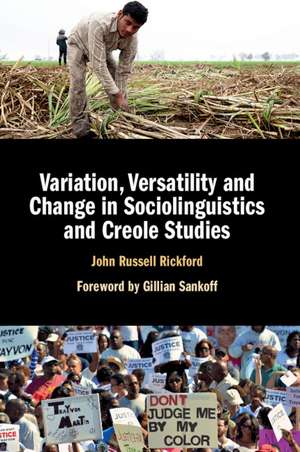Variation, Versatility and Change in Sociolinguistics and Creole Studies
Autor John Russell Rickford Cuvânt înainte de Gillian Sankoffen Limba Engleză Paperback – 10 mar 2021
Preț: 322.12 lei
Nou
Puncte Express: 483
Preț estimativ în valută:
61.64€ • 65.91$ • 51.39£
61.64€ • 65.91$ • 51.39£
Carte tipărită la comandă
Livrare economică 17 aprilie-01 mai
Preluare comenzi: 021 569.72.76
Specificații
ISBN-13: 9781107450554
ISBN-10: 1107450551
Pagini: 388
Ilustrații: 23 b/w illus. 39 tables
Dimensiuni: 151 x 228 x 22 mm
Greutate: 0.52 kg
Editura: Cambridge University Press
Colecția Cambridge University Press
Locul publicării:New York, United States
ISBN-10: 1107450551
Pagini: 388
Ilustrații: 23 b/w illus. 39 tables
Dimensiuni: 151 x 228 x 22 mm
Greutate: 0.52 kg
Editura: Cambridge University Press
Colecția Cambridge University Press
Locul publicării:New York, United States
Cuprins
Foreword Gillian Sankoff; Acknowledgements; Introduction; 1. Sociolinguistic fieldwork in a racial and political maelstrom: getting in, getting on, and primary recording instruments and techniques; 2. Symbol of powerlessness and degeneracy? Or symbol of solidarity and truth? Paradoxical attitudes towards pidgins and creoles with Elizabeth Closs Traugott; 3. 'Me Tarzan, you Jane!': cognition, expression and the creole speaker; 4. The haves and have nots: sociolinguistic surveys and the assessment of speaker competence; 5. Connections between sociolinguistics and pidgin-creole studies; 6. Implicational scales; 7. Variation and the versatility approach to language arts in schools and societies with Angela E. Rickford; 8. Le Page's theoretical and applied legacy in sociolinguistics and creole studies; 9. The social and the linguistic in sociolinguistic variation: Mii en noo (me ain' know); 10. A variationist approach to subject-aux question inversion in Bajan and other Caribbean creole Englishes, AAVE and Appalachian with Robin Melnick; 11. Situation: stylistic variation in sociolinguistic corpora and theory; 12. Language and linguistic on trial: hearing Rachel Jeantel (and other vernacular speakers) in the courtroom and beyond with Sharese King; 13 The continuing need for new approaches to social class analysis in sociolinguistics; 14. Concord and conflict in the speech community; 15. The joy of sociolinguistic fieldwork.
Recenzii
'A much-needed collection showcasing the breadth of Rickford's work. Rickford always underpins careful descriptive work with integrity, and a deep commitment to the theoretical and moral dimensions of intellectual inquiry.' Miriam Meyerhoff, Victoria University of Wellington
'This book has a broad scope, addressing methodological and theoretical issues in sociolinguistics and creole studies, but also in applied and forensic linguistics. The chapters related to language, education, and law are great examples of how the work of linguists can have a meaningful impact on people's lives and the communities they investigate. In this sense, this book is very inspiring; it is a call for action. Action is needed because, as Rickford writes [(p. 49)], although 'all languages are POTENTIALLY equal, […] ACTUAL equality of languages is a myth.' Linguists, as the specialists in language, can act on this. Also, throughout the book Rickford points toward areas of research where more work is needed. This, in my opinion, can be especially useful to students and young scholars.' Marie-Eve Bouchard, LINGUIST List
'This collection brings together a number of influential articles authored by John Rickford, one of the foremost sociolinguists of our time … Rickford's astute analysis and proposals have by no means lost any of their relevance. Quite to the contrary: they starkly demonstrate that it is high time for research on pidgins and creoles to reignite its engagement with sociolinguistic concerns and theorizing. Investigations into pidgins and creoles including the analysis of their usage patterns have much to offer to today's largely English and monolingually focused sociolinguistic paradigm, and creolists will gain more nuanced views of pidgins and creoles through the kind of sociolinguistic research that Rickford has championed.' Bettina Migge, Journal of Pidgin and Creole Languages
'The book draws largely from Rickford's experiences as a fieldworker in Cane Walk in Guyana and a range of creoles. This collection of curated articles and essays written specifically for the text is telling of the magnitude of Rickford's contribution to sociolinguistics and creole studies' Wilfred Fimone, Language in Society
'This book has a broad scope, addressing methodological and theoretical issues in sociolinguistics and creole studies, but also in applied and forensic linguistics. The chapters related to language, education, and law are great examples of how the work of linguists can have a meaningful impact on people's lives and the communities they investigate. In this sense, this book is very inspiring; it is a call for action. Action is needed because, as Rickford writes [(p. 49)], although 'all languages are POTENTIALLY equal, […] ACTUAL equality of languages is a myth.' Linguists, as the specialists in language, can act on this. Also, throughout the book Rickford points toward areas of research where more work is needed. This, in my opinion, can be especially useful to students and young scholars.' Marie-Eve Bouchard, LINGUIST List
'This collection brings together a number of influential articles authored by John Rickford, one of the foremost sociolinguists of our time … Rickford's astute analysis and proposals have by no means lost any of their relevance. Quite to the contrary: they starkly demonstrate that it is high time for research on pidgins and creoles to reignite its engagement with sociolinguistic concerns and theorizing. Investigations into pidgins and creoles including the analysis of their usage patterns have much to offer to today's largely English and monolingually focused sociolinguistic paradigm, and creolists will gain more nuanced views of pidgins and creoles through the kind of sociolinguistic research that Rickford has championed.' Bettina Migge, Journal of Pidgin and Creole Languages
'The book draws largely from Rickford's experiences as a fieldworker in Cane Walk in Guyana and a range of creoles. This collection of curated articles and essays written specifically for the text is telling of the magnitude of Rickford's contribution to sociolinguistics and creole studies' Wilfred Fimone, Language in Society
Notă biografică
Descriere
Demonstrates how data, methods and theories from sociolinguistics and creole studies synergize and mutually benefit each subfield.
